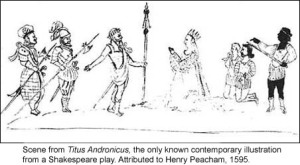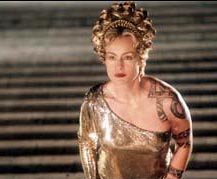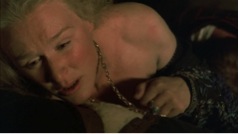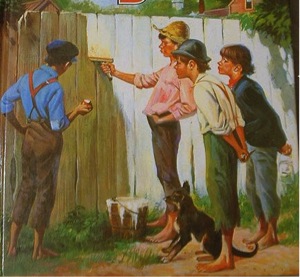Although I can’t claim to be the Shakespeare scholar that Lady Britomart is, I do derive quite a bit of enjoyment (or sick pleasure, if that’s how you take it) from the rather bloody and hilariously crazy plot of Titus Andronicus. I am capable of taking the Bard quite seriously, but this play just takes the head-infused cake. For those unfamiliar with the plot, I offer my detailed synopsis below.
So, there’s this guy named Titus Andronicus – he’s a general in the Roman army during Roman Times, and he’s really good at killing Goths, with whom they’re all at war. But that’s not where the play begins. The Roman Emperor has lately keeled over, and his two sons, Saturninus and Bassianus, decide that they’re going to take advantage of the power vacuum and fight over who gets to rule the world. Bassianus is the good guy, Saturninus bad – which is pretty obvious from the beginning. Saturninus is the oldest, so he has that going for him, but Bassianus is a really good guy, and we know how they fare in Shakespearean tragedies. Anyway, Titus shows up in some glory, and he’s dragging along his prisoners, Tamora, the Queen of the Goths, and her sons Alarbus, Chiron, and Demetrius. Titus decides that it’s only fair that he kills Alarbus, because his son was killed in the war. Trade-off, right? Tamora gets on her knees and really begs for Alarbus’s life, and does a pretty good job of it, to the point where Titus almost gives in…but instead, he decides that the right thing to do would be to uphold the tradition of killing the loser’s oldest son off-stage and bring his guts back onstage to throw on the fire in front of his mother. Well, Titus can’t seem to figure out why Tamora is so pissed about this, and she gives a pretty nice little speech about how she’ll GET HIM.
Because Titus is a stickler for tradition, he convinces the silly Roman people that even though Bassianus is a really good guy, Saturninus is the eldest, and therefore should be emperor. Hooray! Anyway, Titus has this cute daughter, Lavinia, and she’s secretly engaged to Bassianus. Two of her brothers know this, but Titus isn’t aware. Saturninus has his eye on Lavinia, and Titus agrees that she should marry him. This is when Bassianus and Lavinia freak out and decide to run away together, assisted by her two brothers, but Titus sees this as treason. So, Titus kills one of his own sons because they’re being unpatriotic. Saturninus intervenes and then sees Tamora’s hotness. He decides, with a little bit of Tamora’s convincing, that he’d rather marry her than Lavinia, since Lavinia is now obviously a whore. So that works out well – Lavinia and Bassianus get to get married, and Tamora gets to be the Empress of Rome. Hooray!
Hey, did I mention that Tamora has a Moor lover, Aaron? He’s predictably REALLY EVIL. He’s basically around to kill people and do some general plotting with Tamora. Chiron and Demetrius, Tamora’s (alive) sons, saw that hottie Lavinia during the previous scene and decide that they’d like to rape her. Aaron is all for this, and he plots (with Tamora, who’s all for anything causing pain to Titus) with the boys about how to bring this about. There’s a lot of business about a pit for tigers or cats or something, but eventually Bassianus and Lavinia show up while Tamora is hanging out near the pit, and Lavinia starts TAUNTING Tamora. Yeah, that’s not a good move. Anyway, Tamora is pissed, but she already hated these people, so it’s no biggie, and Chiron and Demetrius show up and they’re going to kill Bassianus for “killing” the two dudes already dead in the tiger pit. Lavinia then pleads to Tamora (oh yeah, Lavinia, she’s the flippin’ Empress, remember? No taunting.) for Bassianus’s life, but of course Tamora isn’t having any of that, and the boys dispatch Bassianus and run off with Lavinia, but not before Tamora reminds them to make sure Lavinia can’t go blabbing her tongue about who did the deed.
Aaron is still scheming against Titus, and he wheedles his way into getting two of Titus’s sons accused for Bassianus’s murder. Titus is pretty upset, but Aaron says that Tamora will spare the boys’ lives if Titus gives up one of his hands. That’s right, his hand. Titus’s brother is all about taking the fall and giving up his hand, but Titus pulls a fast one and cuts off his hand before his brother. Aaron takes that back to the Empress, but she’s already killed the boys! Oh no! They bring back the two boys’ heads as proof. Titus is pretty upset, and then it GETS WORSE. Lavinia comes running in with bloody stumps instead of hands, and her tongue has been cut out!!! EEEK. She uses a stick to kind of spell out in sand Chiron and Demetrius as the perps. Needless to say, Titus goes pretty insane. He gets his only surviving son to go talk to the Goths about amassing an army to take over Saturninus and Tamora (that was probably an interesting conversation: “Hey, Goths, so remember how we just finished killing you and capturing your Queen? About that…).
–Meanwhile, in the midst of all of this killing, Tamora finds time to have a mixed-race child, which is obviously Aaron’s. Chiron and Demetrius are all for killing the kid, but Aaron saves his son and runs off. —
There’s a weird scene where Tamora, Chiron, and Demetrius try to appear to Titus as gods, which is pretty stupid. Titus mostly doesn’t buy it, but he is starting to go kind of nuts, so it’s unclear what he’s doing in that scene. He does manage to trick Chiron and Demetrius, capturing them. So, they’re tied up, and Titus taunts them a bit and brings Lavinia in, carrying a big bowl (with whose hands, I don’t know), and Titus proceeds to slit their throats and collect their blood in the bowl. Yum.
Titus pretends that he has decided to let bygones be bygones and invites everyone over for a big dinner party. Tamora and Saturninus are really enjoying their meal, and then Titus is like, “hey, let’s all say hi to Lavinia! Oh yeah! She can’t say hi back because your sons raped and mutilated her.” Titus deems that she’s pretty much worthless (they’re already had their food served by her, so Saturninus agrees) and stabs her in the stomach. She dies, and then Saturninus takes this moment to decide that Titus might be a little bit crazypants, and decides that a good fight might be in order. Titus is like, “hey Tamora, that awesome cake you just had was composed of your sons’ meat!! Whahahahaha!!!” Tamora is pretty upset. Titus then kills Tamora, and Saturninus then kills Titus.
Remember Titus’s son Lucius that was sent up to the Goths to bring back an army? Shakespeare seems to think that the dinner party is a good time bring him back up into the scene, and he sees his dead father and wails a bit. Lucius kills Saturninus to avenge his father’s death. He orders that Tamora’s body should be chopped up and fed to the birds, since she was just an animal anyway. Lucius (or his “people”) also found Aaron and the baby, and he decides that the baby should be spared, since he’s kind of a baby, but Aaron needs to get some comeuppance. Aaron isn’t really apologetic at all, so they decide to bury him in the sand and keep his head outside so that he’ll eventually die and be eaten by birds or other wild animals (maybe those tigers).
That’s pretty much it.










